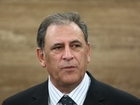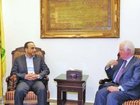Spotlight
Caretaker Prime Minister Saad Hariri blamed on Wednesday the 15-year civil war for the current reality in Lebanon where “sectarian statelets and armed groups” have been established to serve internal and regional interests.
He said in a statement marking the 36th anniversary of the eruption of the Lebanese civil war: “The memory of the war should remain in the past and we hope that it will not be repeated.”
 Full Story
Full Story
Maronite Patriarch Beshara al-Rahi said Wednesday that he would activate the dialogue between Bkirki and Hizbullah upon his return from the Vatican at the end of the week.
He told Radio Charity and Voice of Lebanon stations in an interview from Rome that he had asked the Hizbullah delegation that visited him in Bkirki on the occasion of his election last month to reactivate the committee.
 Full Story
Full Story
France’s Ambassador to Lebanon Denis Pietton discussed with Premier-designate Najib Miqati on Wednesday the latest developments on the new government formation process.
“Miqati is concerned about forming a balanced government,” Pietton said, telling reporters after the meeting that the administrative appointments require a “balanced and a widely represented government.”
 Full Story
Full Story
Mustaqbal bloc MP Jamal al-Jarrah denied on Wednesday Syrian allegations that he had funded a terrorist cell to create unrest in Syria.
He told Al-Jadeed television on Wednesday: “The programmed Syrian confessions are aimed at tarnishing the image of a certain political camp and if they had proof of their claims then they should address the Lebanese Foreign Ministry.”
 Full Story
Full Story
The March 14 camp believed that Michel Suleiman’s election as president would “embarrass” Hizbullah and harm Free Patriotic Movement leader MP Michel Aoun, revealed a leaked U.S. Embassy cable published exclusively in Al-Akhbar newspaper on Wednesday.
The November 4, 2007, WikiLeaks cable spoke of a meeting between the head of the Mustaqbal movement Saad Hariri and then U.S. Ambassador to Lebanon Jeffery Feltman during which the former informed him that the March 14 camp had not reached an agreement over a presidential candidate, less than a month before then President Emile Lahoud’s term was scheduled to end.
 Full Story
Full Story
Saudi Arabia was fully convinced that Assef Shawkat, Syrian President Bashar Assad’s brother-in-law, was conspiring to kill caretaker PM Saad Hariri and former PM Fouad Saniora, according to a WikiLeaks cable.
During a meeting with then U.S. Ambassador Jeffrey Feltman, Saudi chief of mission Abdul Aziz Khoja described Hizbullah as “the devil,” according to the cable dated November 3, 2007 and published Wednesday by al-Akhbar daily.
 Full Story
Full Story
The United States initially opposed Michel Suleiman’s election as president, revealed a leaked U.S. Embassy cable published exclusively in Al-Akhbar on Wednesday.
The October 16, 2007, WikiLeaks cable spoke of a meeting between then Army Commander Michel Suleiman and then U.S. Ambassador to Lebanon Jeffrey Feltman during which the former rejected claims that he was a “Syrian agent”, voicing fears over what Damascus had in store for Lebanon.
 Full Story
Full Story
Lebanese Forces leader Samir Geagea had reportedly backed Nassib Lahoud, Butros Harb and Charles Rizk “as a last resort” for the presidency.
According to a WikiLeaks cable dated November 8, 2007 published by al-Akhbar daily on Wednesday, Geagea told then U.S. ambassador Jeffrey Feltman that the candidates he backed for the presidency are Lahoud, Harb and Rizk “as a last resort.”
 Full Story
Full Story
U.N. Special Coordinator for Lebanon Michael Williams hoped that the seven kidnapped Estonians bicyclists would soon return safely to their families for they came to Lebanon “with no ill intent and their early return to their own country I think is of the utmost importance.”
Williams discussed the situation in Lebanon and also the dramatic developments in the broader Arab region with Hizbullah International Relations Official Ammar Moussawi on Tuesday.
 Full Story
Full Story
Internal Security Forces chief Maj. Gen. Ashraf Rifi described last week’s mutiny at Roumieh prison as an “organized rebellion” which could have spiraled out of control had the authorities not put an end to it.
“The protest movements that renewed at Roumieh prison last Monday and were accompanied by the burning of tires in (several) regions, showed that there was a single unit moving both the prisoners and their families,” Rifi told An Nahar daily in remarks published Wednesday.
 Full Story
Full Story




